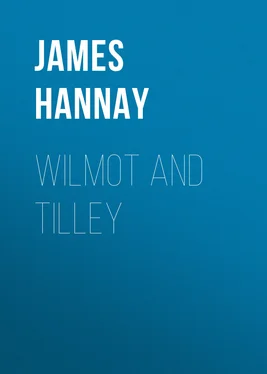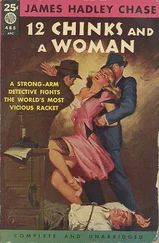James Hannay - Wilmot and Tilley
Здесь есть возможность читать онлайн «James Hannay - Wilmot and Tilley» — ознакомительный отрывок электронной книги совершенно бесплатно, а после прочтения отрывка купить полную версию. В некоторых случаях можно слушать аудио, скачать через торрент в формате fb2 и присутствует краткое содержание. Жанр: foreign_prose, foreign_antique, на английском языке. Описание произведения, (предисловие) а так же отзывы посетителей доступны на портале библиотеки ЛибКат.
- Название:Wilmot and Tilley
- Автор:
- Жанр:
- Год:неизвестен
- ISBN:нет данных
- Рейтинг книги:3 / 5. Голосов: 1
-
Избранное:Добавить в избранное
- Отзывы:
-
Ваша оценка:
- 60
- 1
- 2
- 3
- 4
- 5
Wilmot and Tilley: краткое содержание, описание и аннотация
Предлагаем к чтению аннотацию, описание, краткое содержание или предисловие (зависит от того, что написал сам автор книги «Wilmot and Tilley»). Если вы не нашли необходимую информацию о книге — напишите в комментариях, мы постараемся отыскать её.
Wilmot and Tilley — читать онлайн ознакомительный отрывок
Ниже представлен текст книги, разбитый по страницам. Система сохранения места последней прочитанной страницы, позволяет с удобством читать онлайн бесплатно книгу «Wilmot and Tilley», без необходимости каждый раз заново искать на чём Вы остановились. Поставьте закладку, и сможете в любой момент перейти на страницу, на которой закончили чтение.
Интервал:
Закладка:
In 1833 the House of Assembly appointed a committee on grievances for the purpose of taking into consideration and investigating all matters in connection with the Crown lands, which were the subject of complaint. After this committee had reported to the House, it was resolved to send a deputation to England to endeavour to make some arrangement with the colonial secretary in reference to the Crown lands.
MR. STANLEY'S DESPATCH
The deputies appointed to proceed to England and lay the grievances of the province at the foot of the throne were Charles Simonds and Edward B. Chandler, both men of wealth, influence and position, and well qualified for the performance of the work with which they were entrusted. Messrs. Chandler and Simonds arrived in England in June, 1833, and immediately placed themselves in communication with the Right Honourable E. G. Stanley, who was then colonial secretary. Their report was laid before the legislature in February, 1834, and the result was highly satisfactory to the House of Assembly. A few days later a despatch from Mr. Stanley to Sir Archibald Campbell was laid before the House, in which he stated the terms on which he should feel that His Majesty might properly be advised to place the proceeds of the casual and territorial revenue under the control of the assembly of New Brunswick. He would, he said, be prepared to advise His Majesty to accept a permanent appropriation by the legislature, duly secured to the amount of fourteen thousand pounds per annum, and that the Crown should undertake to charge on any such permanent grant the salaries of the lieutenant-governor, his private secretary, the commissioner of Crown lands, provincial secretary, chief-justice, three puisne judges, the attorney-general, auditor, receiver-general, the expenses of the indoor establishment of the Crown lands department, and a grant of one thousand pounds to the college. It would be necessary, Mr. Stanley stated, that any bill passed in consequence of the proposal contained in this despatch should contain a suspending clause in order that it might be submitted to His Majesty before it was finally assented to. It was also stated, in order to prevent misunderstanding or delay, that the House should be apprised, that, unless some other fully equivalent and sufficient security could be devised, it would be expected that the Act should provide that the stipulated annual commutation should be payable out of the first receipts in each year, and that in case of any default in such payment the whole of the revenue surrendered should revert to the Crown. A committee was appointed to prepare the bill on the subject of the surrender by His Majesty of the casual and territorial revenues of the province. The House of Assembly had previously passed a resolution that the sum of fourteen thousand pounds required by His Majesty's government as a permanent grant for the surrender of the casual and territorial revenues of the province was greater than the charges contemplated to be thereon required, yet that the great desire of the House of Assembly to have this important subject finally settled should induce them to accept the proposal contained in Mr. Stanley's despatch. On the day after this resolution was passed, the lieutenant-governor communicated to the House of Assembly an extract from a despatch received the previous day by him from the Right Honourable Mr. Stanley, dated January 4th, 1834. This extract was as follows:—
"In your message communicating to the assembly the proposal contained in my despatch of the 30th September, you will take care distinctly to explain that the payments expected from the New Brunswick Land Company are not included in the revenue which is offered to the acceptance of the assembly." It is with great regret that an historian of this period must record the receipt of such a despatch from an imperial head of department to a colonial governor, for the spirit displayed in the message was not that of an enlightened statesman, but such as might have been expected from one who was endeavouring to drive the hardest possible bargain with the province of New Brunswick, in order that a number of officials, swollen with pride and enjoying enormous salaries, might not suffer.
NEGOTIATIONS FAIL
A few days after the receipt of this despatch, a resolution was passed by the House in committee, regretting that the additional condition contained in Mr. Stanley's last despatch would prevent the committee recommending to the House further action in the matter of preparing a civil list bill. Thus ended the attempt to settle this vexed question in the year 1834. The House of Assembly, however, still continued to agitate the matter, and to make Sir Archibald Campbell's life a burden to him. On March 7th, they addressed him, asking for accounts in detail of the casual and territorial revenues, and calling for a number of statements which they had not received except in such a shape that they could not be properly understood. They also addressed His Excellency, requesting him to lay before them copies of all official despatches transmitted to him by the secretary of state for the colonies, since he assumed the administration of the government, relating to the subject of the casual and territorial revenues. The reply of His Excellency to the request for more detailed accounts was a courteous one; but while he consented to furnish the accounts requested in detail, it was with the understanding that his compliance was not to be considered as a precedent. He declined, however, to give the names of the parties who had their timber seized or forfeited, or the names of the petitioners for Crown land. He also refused to furnish the accounts of the receiver-general and commissioner of Crown lands, on the ground that they were accounts exclusively between these officers and the Crown.
With regard to the request for his correspondence with the colonial secretary, Sir Archibald Campbell in another message gave a tart refusal, stating that such a request was subversive of the principles and spirit of the British constitution, and that he would ill deserve the confidence put in him by His Majesty were he to hesitate in meeting so dangerous an encroachment, not only on the independence of the executive, but the prerogatives of the British Crown, with a most decided and unqualified refusal. This military officer considered himself a proper exponent of the principles and spirit of the British constitution. He failed to understand that the British constitution rests upon the support of the people, while his system of government was intended to ignore the people altogether.
QUARREL WITH THE GOVERNOR
A few days after the receipt of this message, a resolution was passed by the House of Assembly declaring that the language used by the lieutenant-governor, in his reply to the address of the House, was at variance with all parliamentary precedent and usage, and such as was not called for by the address. Some of the governor's friends attempted to weaken the force of this resolution by an amendment of a milder nature, but their amendment was defeated, and the resolution carried by a vote of fifteen to eight. Another address on the subject of the casual and territorial revenues and civil list was prepared and passed by the assembly for the purpose of being forwarded to His Majesty. It recited the proceedings, in regard to the matter, which had taken place already, and the desire of the House of Assembly to accept the proposition contained in Mr. Stanley's despatch, and expressed the regret of the House at the new condition imposed with regard to the New Brunswick Land Company, which made it impossible to accept the settlement as amended. The House concluded by expressing the hope that the terms proposed in the original despatch might yet be considered definitive, and that the proviso with regard to the New Brunswick Land Company might be withdrawn. This was transmitted to England; but, before the year ended, Sir Archibald Campbell concluded to rid himself of the House of Assembly, which had given him so much annoyance, and accordingly it was dissolved early in November; so that when the legislature met again in January, 1835, the House was a new one, although largely composed of the old members.
Читать дальшеИнтервал:
Закладка:
Похожие книги на «Wilmot and Tilley»
Представляем Вашему вниманию похожие книги на «Wilmot and Tilley» списком для выбора. Мы отобрали схожую по названию и смыслу литературу в надежде предоставить читателям больше вариантов отыскать новые, интересные, ещё непрочитанные произведения.
Обсуждение, отзывы о книге «Wilmot and Tilley» и просто собственные мнения читателей. Оставьте ваши комментарии, напишите, что Вы думаете о произведении, его смысле или главных героях. Укажите что конкретно понравилось, а что нет, и почему Вы так считаете.












